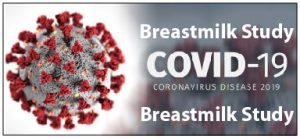Update
Please also see the recent blog update on our studies, however please note:
* We have completed our nationwide-recruitment for the COVID and SARS-CoV2 vaccine studies and are no longer recruiting for the project.*
The current work includes looking at humoral and cellular immune responses in milk of lactating women who get the COVID vaccine. We are using breast milk samples donated by medical professionals in the first round of immunizations. You can find more related updates via our blog index.
Breastmilk Research to Help Understand COVID-19
Are you breastfeeding and have you been recently diagnosed with COVID-19 or do you have COVID-19 symptoms, such as fever, cough, shortness of breath, fatigue, loss of smell or taste? Please consider participating in this study of breastmilk from mothers with COVID-19 if you fit the recruitment profile.
We are seeking lactating women to enroll our study. You can join the study if:
- You have given birth in the past 146 days (5 months)
- Your COVID symptoms started in the past 21 days
- You have a positive COVID test (talk to us about getting started if you are waiting for test results).
You can see our blog post on breastfeeding and COVID 19.
Studying the antibodies and immune cells in breastmilk to understand their protective effects against COVID 19
Little is known about the effects on breastmilk of infection with SARS-CoV-2, the virus that causes the COVID-19 illness, however, the few studies completed to date suggest that the virus is not present in breastmilk collected immediately after birth.
It is thought that antibodies produced in response to SARS-CoV-2 infection are present in breastmilk and may help protect the breastfed baby. There is a general agreement that women diagnosed with COVID-19 should continue to breastfeed. We want to determine the immune response to COVID-19 infection that is present in breastmilk of women. We are especially interested in determining the time-course of the antibody response. To do this we will compare breastmilk from women diagnosed with COVID-19 to milk collected from women who did not have COVID-19. However, there are additional dimensions to the immune response to infection.
We will relate immune responses in the milk of infected lactating women to COVID-19 symptoms and lactation stage. We will measure levels of molecules that have a role in inflammatory responses (they cause ‘flu-like’ symptoms) with special attention to factors known to be linked to COVID-19 symptoms in patient blood. We will examine the evolution with time of the IgM, IgA, and IgG antibodies classes in breast milk. We want to test the neutralizing abilities of antibodies – their ability to block the infection process. Data for milk will be compared to that in a limited set of maternal blood spot samples in addition to published data for blood. At specific timepoints, to understand antibody and immune cell transfer to the baby, we will look at the immune cell profiles in milk in addition to anti-SARS-CoV-2 antibodies.
Lactating women eligible for our COVID-19 research
Researchers at the University of Massachusetts Amherst are looking for breastfeeding mothers who have tested positive for COVID-19 or have COVID-19 symptoms to participate in a breastmilk study. Mothers can live anywhere in the continental US. Compensation will be provided.
How nursing moms can join the Umass Amherst SARS-CoV-2 study
contact
Dr. Kathleen Arcaro
